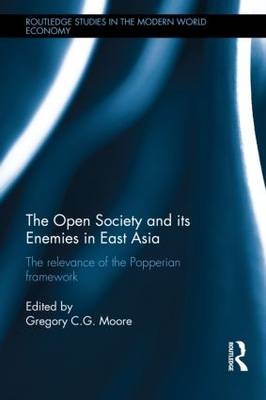
The Open Society and its Enemies in East Asia
Routledge (Verlag)
978-0-415-73923-8 (ISBN)
The narrative of this book is driven by a research agenda that is inter-disciplinary in nature, since to make the link between the Popperian framework and East Asian socio-economic relationships the contributing authors needed to draw upon research fields as far apart as political philosophy and East-Asian studies. With one or two exceptions, however, nearly all of the contributing authors have a background in economics, and this background is reflected in the way that they have sought to tackle the research question. This book is, in short, an inter-disciplinary exercise undertaken from an economics perspective, and hence it may best be described as an exercise in political economy rather than pure analytical economics.
The novelty of juxtaposing Popperian ideas with a discussion of social, political and economic development in South East Asia makes this narrative of interest to both political philosophers and specialists in South East Asian economies. The key insight drawn from the analysis is that although Karl Popper’s The Open Society and Its Enemies was a product of a European time and place, it is also relevant to anyone seeking to understand the recent history of the East Asian economies.
Professor Gregory Moore is Professor of Economics, The University of Notre Dame, Australia. He has published extensively in international refereed journals and was co-editor of the History of Economics Review from 2007 to 2011.
Prefatory Remarks. The Context for the Open Society and its Enemies in East Asia Gregory C. G. Moore 1. Karl Popper and the Idea of an Open Society Jeremy Shearmur 2. Karl Popper and Thailand’s Political Crisis: The Monarchy as the Problem for an ‘Open Society’ Patrick Jory 3. Thai Populism and the Middle Income Trap Peter Warr 4. Least Free: The Economic Consequences of Fifty Years of Totalitarian Rule in Burma Sean Turnell 5. Development and Freedom in Burma Ron Findlay 6. The Rise and Robustness of Economic Freedom in China Rod Tyres 7. Karl Popper’s Idea of an Open Society: A Challenge to and from, Singapore Jeremy Shearmur 8. Popular Despotism: An Economist’s Explanation William Coleman
| Reihe/Serie | Routledge Studies in the Modern World Economy |
|---|---|
| Zusatzinfo | 5 Tables, black and white; 1 Line drawings, black and white; 1 Illustrations, black and white |
| Verlagsort | London |
| Sprache | englisch |
| Maße | 156 x 234 mm |
| Gewicht | 490 g |
| Themenwelt | Naturwissenschaften ► Geowissenschaften ► Geografie / Kartografie |
| Sozialwissenschaften ► Soziologie ► Spezielle Soziologien | |
| Wirtschaft ► Allgemeines / Lexika | |
| Wirtschaft ► Volkswirtschaftslehre ► Makroökonomie | |
| Wirtschaft ► Volkswirtschaftslehre ► Wirtschaftspolitik | |
| ISBN-10 | 0-415-73923-3 / 0415739233 |
| ISBN-13 | 978-0-415-73923-8 / 9780415739238 |
| Zustand | Neuware |
| Haben Sie eine Frage zum Produkt? |
aus dem Bereich


